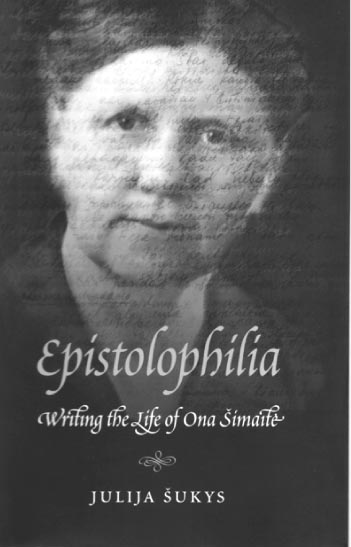
Copyright © 2012 LITUANUS Foundation, Inc.
Volume 58, No.3 - Fall 2012
Editor of this issue: Elizabeth Novickas
 LITHUANIAN
QUARTERLY JOURNAL OF ARTS AND SCIENCES
|
ISSN
0024-5089
Copyright © 2012 LITUANUS Foundation, Inc. |
|
Volume 58, No.3 - Fall 2012 Editor of this issue: Elizabeth Novickas |
Book Review
 |
Ona Šimaitė, a hero of the Holocaust, would seem to be a likely subject for a biography, but in Julija Šukys’s lovely book we soon discover just how difficult it can be to reconstruct the life of a woman who dedicated herself to looking after others.
Šimaitė’s
efforts to help those trapped in the ghetto of Vilnius during the years
of German occupation led to her 1944 arrest, interrogation, torture,
and deportation to Dachau. She never returned to Lithuania, living out
most of the rest of her life in France, working at times as a servant.
She was an obsessive letter-writer, but in her letters she rarely
touched upon the war years or the time she spent in the camps. Although
Šimaitė had been recognized as one of Yad Vashem’s
“Righteous Among the Nations,” the memoir she had
written at the time of those events was lost. Despite numerous urgings,
Šimaitė apparently never attempted to rewrite it, and the
significance of this silence is one of the themes explored in the book.
Šukys weaves this unusual biography out of her own quest to
learn more about Šimaitė and the era she lived through,
together with the sometimes homely details of life Šimaitė
left behind in her letters and journals. As
Šukys travels through Europe and Israel tracing Šimaitė’s path, occasionally bringing her young son along, she explores further questions about women’s life-writing and her own struggles to find the time to write. Along the way, we make further excursions into the lives of the people Šimaitė corresponded with, including the tragic end of the poet Kazys Jakubėnas; the mysterious suicide of the young, successful editor Tayda Devėnaitė; and Šimaitė’s niece Aldutė, whose diagnosis of schizophrenia provides a sidelight into mental illness in the Soviet Union.
The book includes two maps, twenty-four illustrations, and a bibliography.
Elizabeth Novickas